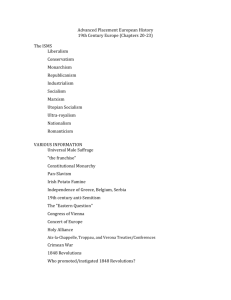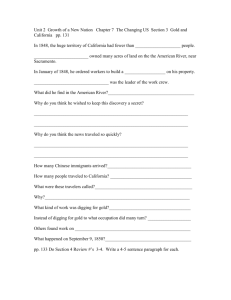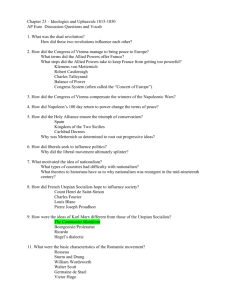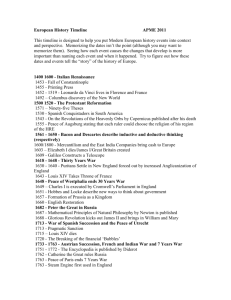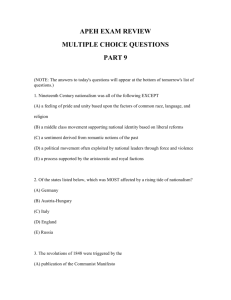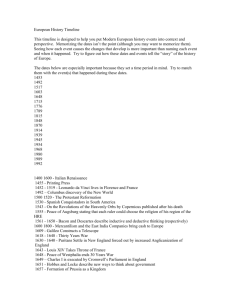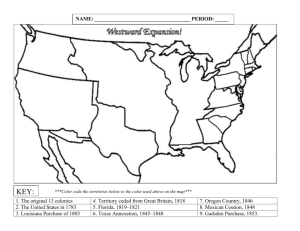File
advertisement
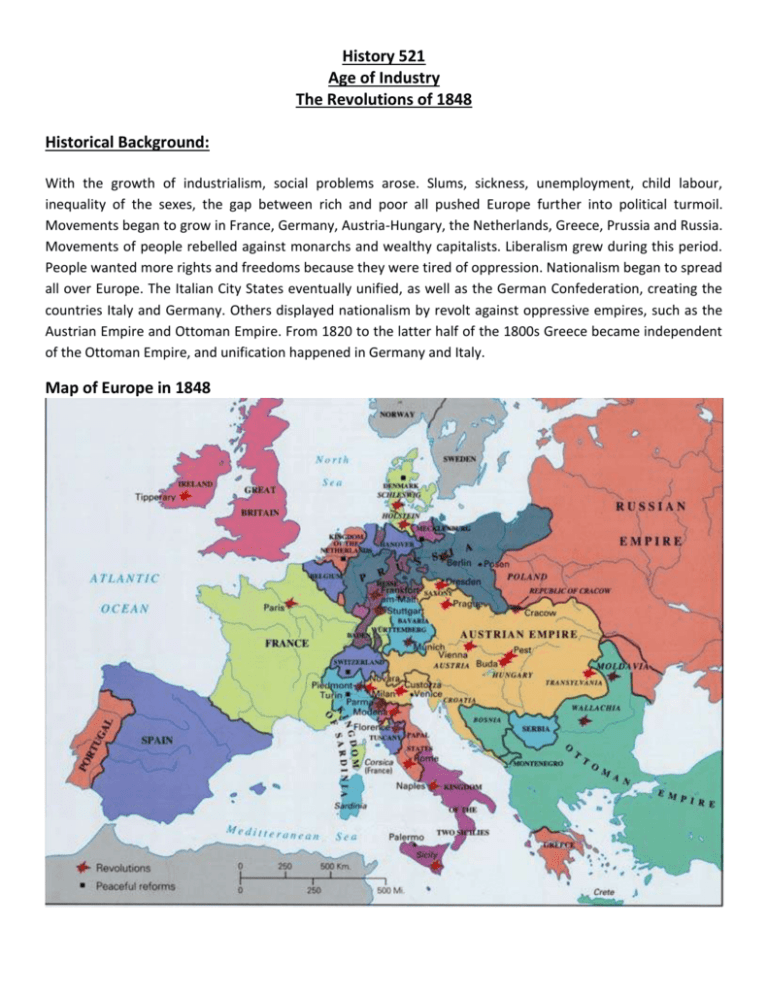
History 521 Age of Industry The Revolutions of 1848 Historical Background: With the growth of industrialism, social problems arose. Slums, sickness, unemployment, child labour, inequality of the sexes, the gap between rich and poor all pushed Europe further into political turmoil. Movements began to grow in France, Germany, Austria-Hungary, the Netherlands, Greece, Prussia and Russia. Movements of people rebelled against monarchs and wealthy capitalists. Liberalism grew during this period. People wanted more rights and freedoms because they were tired of oppression. Nationalism began to spread all over Europe. The Italian City States eventually unified, as well as the German Confederation, creating the countries Italy and Germany. Others displayed nationalism by revolt against oppressive empires, such as the Austrian Empire and Ottoman Empire. From 1820 to the latter half of the 1800s Greece became independent of the Ottoman Empire, and unification happened in Germany and Italy. Map of Europe in 1848 Map of Europe 2013 The concept of nationalism was a very strong force in Europe during the 19th and 20th centuries. A nation is defined as an identifiable group which lives in a specific geographic territory, which has linguistic, cultural, and religious bonds. The Germans, Japanese, Koreans, French would all be examples of nations. Nationalism is the idea that the nation is more important than the individual and that the nation should be unified, defended, and expanded. Comparing the map of Europe from 1848 with the one from today, what role did nationalism play in the 1848 revolutions. Discuss and explain: What were the causes of the 1848 Revolutions? Document 1 The Overthrow of the Orleanist Monarchy in France, 1848 In the name of the French people: A reactionary and oligarchical government has just been overthrown by the heroism of the people of Paris. That government has fled, leaving behind it a trail of blood that forbids it ever to retrace its steps. The blood of the people has flowed as in July; but this time this noble people shall not be deceived. It has won a national and popular government in accord with the rights, the progress, and the will of this great and generous nation. A provisional government, the result of pressing necessity and ratified by the voice of the people and of the deputies of the departments, in the session of February 24, is for the moment invested with the task of assuring and organizing the national victory. It is composed of Messieurs Dupont (de l'Eure), Lamartine, Cremieux, Arago (of the Institute), Ledru-Rollin, Garnier-Pages, Marie, Armand Marrast, Louis Blanc, Ferdinand Flocon, and Albert (a workingman). These citizens have not hesitated a moment to accept the patriotic commission which is imposed upon them by the pressure of necessity. With the capital of France on fire, the justification for the present provisional government must be sought in the public safety. All France will understand this and will lend it the support of its patriotism. Under the popular government which the provisional government proclaims, every citizen is a magistrate. Frenchmen, it is for you to give to the world the example which Paris has given to France; prepare yourselves by order and by confidence in your destiny for the firm institutions which you are about to be called upon to establish. The provisional government wishes to establish a republic,--subject, however, to ratification by the people, who shall be immediately consulted. The unity of the nation (formed henceforth of all the classes of citizens who compose it); the government of the nation by itself; liberty, equality, and fraternity, for fundamental principles, and "the people" for our emblem and watchword: these constitute the democratic government which France owes to itself, and which our efforts shall secure for it. According to Document 1, what were the causes of the 1848 Revolution in France? What were people fighting for? Document 2 Decrees of the Provisional Government Relating to the Workingmen (France) The provisional government of the French republic decrees that the Tuileries shall serve hereafter as a home for the veterans of labor. The provisional government of the French republic pledges itself to guarantee the means of subsistence of the workingman by labor. It pledges itself to guarantee labor to all citizens. It recognizes that workingmen ought to enter into associations among themselves in order to enjoy the advantage of their labor. The provisional government returns to the workingmen, to whom it rightfully belongs, the million which was about to fall due upon the civil list. The provisional government of the French republic decrees that all articles pledged at the pawn shops since the first of February, consisting of linen, garments, or clothes, etc., upon which the loan does not exceed ten francs, shall be given back to those who pledged them. The minister of finance is ordered to meet the payments incidental to the execution of the present edict. The provisional government of the republic decrees the immediate establishment of national workshops. The minister of public works is charged with the execution of the present decree. According to Document 2, what were the causes of the 1848 Revolution in France? Document 3 The National Song of Hungary, 1848 RISE, Magyar! is the country's call! The time has come, say one and all: Shall we be slaves, shall we be free? This is the question, now agree! For by the Magyar's God above We truly swear, We truly swear the tyrant's yoke No more to bear! Alas! till now we were but slaves; Our fathers resting in their graves Sleep not in freedom's soil. In vain They fought and died free homes to gain. But by the Magyar's God above We truly swear, We truly swear the tyrant's yoke No more to bear! A miserable wretch is he Who fears to die, my land, for thee! His worthless life who thinks to be Worth more than thou, sweet liberty! Now by the Magyar's God above We truly swear, We truly swear the tyrant's yoke No more to bear! According to Document 3, what were the causes of the 1848 Revolution in Hungary? Document 4 Karl Marx commenting on the 1848 Revolution in Austria The Revolution of Vienna may be said to have been made by an almost unanimous population. The bourgeoisie (with the exception of the bankers and stock-jobbers), the petty trading class, the working people, one and all arose at once against a Government detested by all, a Government so universally hated, that the small minority of nobles and money lords which had supported it made itself invisible on the very first attack. The middle classes had been kept in such a degree of political ignorance by Metternich that to them the news from Paris about the reign of Anarchy, Socialism, and terror, and about impending struggles between the class of capitalists and the class of laborers, proved quite unintelligible. They, in their political innocence, either could attach no meaning to these news, or they believed them to be fiendish inventions of Metternich, to frighten them into obedience. They, besides, had never seen working men acting as a class, or stand up for their own distinct class interests. They had, from their past experience, no idea of the possibility of any differences springing up between classes that now were so heartily united in upsetting a Government hated by all. They saw the working people agree with themselves upon all points: a Constitution, Trial by Jury, Liberty of the Press, etc. Thus they were, in March, 1848, at least, heart and soul with the movement, and the movement, on the other hand, at once constituted them the (at least in theory) predominant class of the State. But it is the fate of all revolutions that this union of different classes, which in some degree is always the necessary condition of any revolution, cannot subsist long. No sooner is the victory gained against the common enemy than the victors become divided among themselves into different camps, and turn their weapons against each other. It is this rapid and passionate development of class antagonism which, in old and complicated social organisms, makes a revolution such a powerful agent of social and political progress; it is this incessantly quick upshooting of new parties succeeding each other in power, which, during those violent commotions, makes a nation pass in five years over more ground than it would have done in a century under ordinary circumstances. Discussion Questions: 1. According to Marx, what were the causes of the 1848 Revolution in Vienna, Austria? 2. According to Marx, was the 1848 Revolution a communist revolution? What would he have thought about this revolution? Why might he believe that this revolution was incomplete? Write an introduction and thesis statement for the following question: Discuss the causes of the 1848 Revolutions in Europe. __________________________________________________________________________________________ __________________________________________________________________________________________ __________________________________________________________________________________________ __________________________________________________________________________________________ __________________________________________________________________________________________ __________________________________________________________________________________________ __________________________________________________________________________________________ __________________________________________________________________________________________ __________________________________________________________________________________________ __________________________________________________________________________________________ __________________________________________________________________________________________ __________________________________________________________________________________________ __________________________________________________________________________________________ __________________________________________________________________________________________ __________________________________________________________________________________________ __________________________________________________________________________________________
